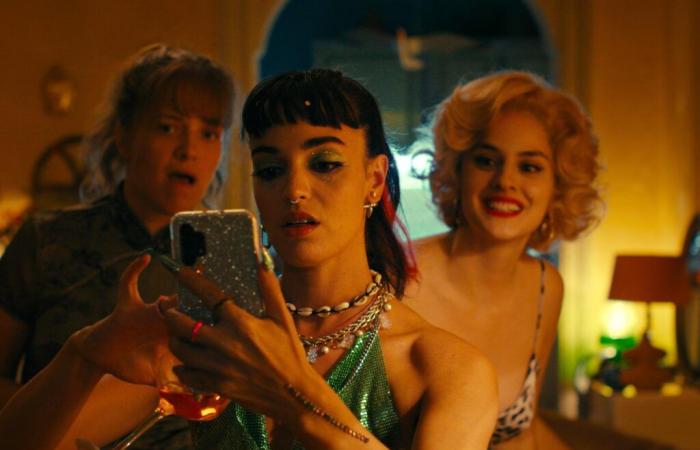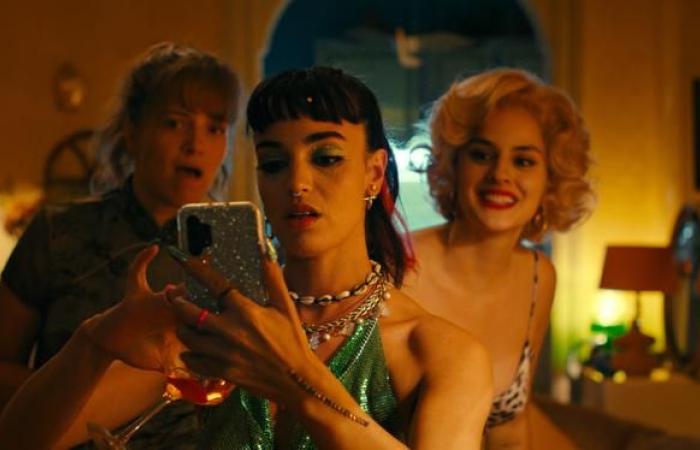THE OPINION OF THE “WORLD” – WHY NOT
Of Portrait of the girl on fire (2019) to Emmanuelle (2024), Noémie Merlant used her intensity as an actress to support a real sub-genre of French cinema: post-#MeToo fiction. The liberation of women's voices would find its cinematic translation there, and each film, like a laboratory of representations, would attempt to deprogram brains which have been exposed for too long to a version of male-female relationships mainly orchestrated by men.
It is also this program that Noémie Merlant sets for herself as director in Women on the balconyhis second feature film, co-written with Céline Sciamma. The film opens with Hitchcockian auspices. In the middle of a heatwave, a long sequence shot sweeps across the busy facade of a Marseille building, before focusing its attention on an apartment where our three heroines live, in a happy, colorful brothel. There is Nicole (Sanda Codreanu), an aspiring writer who is struggling to deliver her first novel; Ruby (Souheila Yacoub), sassy camgirl with limitless sexuality; and Elise (Noémie Merlant), an actress on the verge of a nervous breakdown who has a toxic relationship with a lawyer.
Lounging on a balcony in 46 degree weather: we painfully overcome incoherence. Still, this pretext was necessary for the young women to admire, right in front of their homes, their handsome and mysterious neighbor (Lucas Bravo) who struts around shirtless and ends up inviting the three roommates for a drink. We talk, we drink, we laugh – then Nicole and Elise disappear, leaving Ruby with the handsome photographer. The rest will happen off-camera.
A formal flamboyance
From her evening, Ruby will return traumatized and stained with blood, with a corpse on her arms. This dead weight that must be gotten rid of is the obvious metaphor of a male point of view rendered silent, neutralized, and who must now listen, from beyond the grave, to what women have to say. Men, moreover, Noémie Merlant decides not to save any of them: there is the rapist, the selfish lover, the horde of rapist ghosts, the macho cashier who leaves with a lesson in feminism. Although we understand the idea, the caricature here suits the feminist issue well.
Read the interview Article reserved for our subscribers An aperitif with Noémie Merlant: “I’ve never been asked so much if I was single”
Read later
Everything in Women on the balcony is colorful, supercharged, electrified by all the things that Noémie Merlant wants to say and show. We move from gore to fantasy, from comedy to drama, in a formal flamboyance borrowed from Almodovar. This keen appetite for cinema ends up getting bogged down in the dissertation, and in a desire to check all the boxes of the perfect post-#MeToo scenario which would not omit any subject: abortion, rape, desexualized nudity (we are here a little circumspect), periods, farts, masturbation, sorority, a burlesque appointment with the gynecologist – rare scene which, in its murky calm, catches something on the bodies of women.
This catalog ends up appearing as the very heart of the film. This is what he wanted to show us, without saying anything very original about it, and forgetting in the process to create a fiction in proper form. Because, by so quickly giving itself the appearance of a manifesto, The Women of the Balcony eludes the essential: exploring the ambiguities of its heroines and the gray areas of all sexuality, rather than lecturing. And then open a space that would give the spectator room to do the work that is theirs, that is to say, to hear themselves think.
You have 2.65% of this article left to read. The rest is reserved for subscribers.







